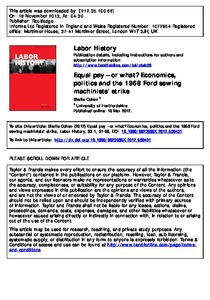Equal pay – or what? Economics, politics and the 1968 Ford sewing machinists' strike

2012
53
1
51-68
equal pay ; history ; automobile industry ; strike ; trade union role
Labour disputes
http://dx.doi.org/10.1080/0023656X.2012.650431
English
Bibliogr.
"The 40-year anniversary of the Equal Pay Act in 2010 brought a new notoriety to what was once an obscure dispute – the Ford sewing machinists' strike of 1968. Even a film, Made In Dagenham, has now been released in Britain and the US and, as described below, a number of letters and articles have appeared celebrating what is universally described as ‘a strike for equal pay'. Yet the sewing machinists' placards at their union conference proclaiming ‘Equal Rights' are probably the nearest the workers themselves got to a demand for equal pay. That demand was instead developed by the male trade unionists who came to control the dispute. The one woman in the case who enthusiastically embraced the concept of equal pay – Minister of Labor Barbara Castle – did so only in order to get the women back to work. Classifying the 1968 strike as ‘a strike for equal pay' conceals its real importance as a protest against injustice and exploitation."
Digital
The ETUI is co-funded by the European Union. Views and opinions expressed are however those of the author(s) only and do not necessarily reflect those of the European Union or the ETUI.